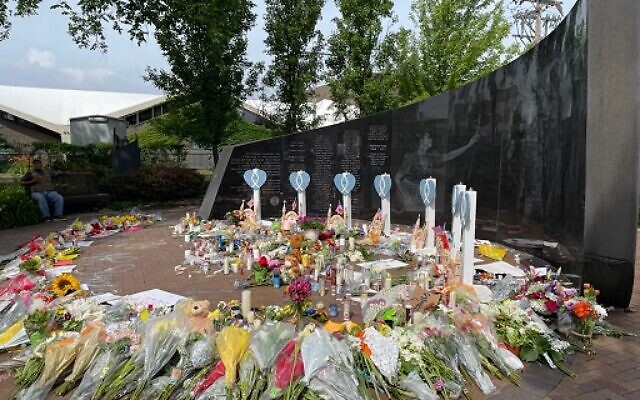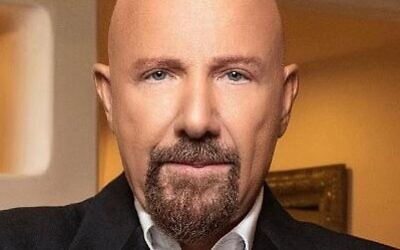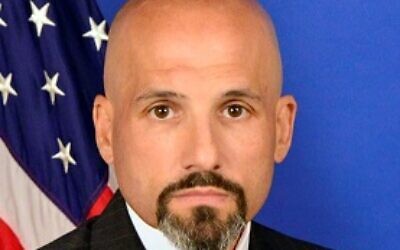Former Highland Park Resident Shaken by Shooting
Cliff Mazer remembers growing up in the Chicago suburb as idyllic and family-oriented.

Subconsciously, Cliff Mazer thinks that he may have chosen to live in Sandy Springs when he moved to the Atlanta area in 1989 because it reminded him of Highland Park, Ill., where he had grown up.
The two cities are both “leafy suburbs, affluent and a little bit Jewish,” Mazer said. His home is off Riverside Drive and its curves, with rocks on the side, are reminiscent of the city near Lake Michigan, north of Chicago.
Mazer describes growing up in Highland Park as “idyllic, sheltered, a real cocoon, warm, family-oriented. It was a beautiful place, and the people weren’t too pretentious. Schools were and are excellent and the food was very good.”
That American-as-apple-pie picture was shattered July 4 when a shooter rained death and horror from atop a building on a much-beloved annual Independence Day parade. Seven people were killed and dozens injured as parade participants and spectators scattered in fear.
A few days later, Mazer, who also has a home in Sarasota, Fla., said he still felt “very shaken. I’ve seen a lot in my 68 years,” the Highland Park High School graduate recalled.
He attended the University of Colorado in Boulder, which he also envisioned as a protected city, feeling it “would never happen here.” In March 2021, 10 people were killed by a mass shooter in a supermarket in Boulder. For Mazer, “a sense of innocence was lost.”
“I think for Highland Park people, whether there at the parade or part of the far-flung diaspora living elsewhere, there is clearly still a lingering, discombobulated, disbelieving, distraught posttraumatic effect occurring that in my generation’s terminology would be called ‘completely freaked out.’
“Obviously, it will take a long time to come fully to terms with a tragedy like this.”

Mazer said he didn’t know anyone who was killed in the shooting, but he knows people who knew someone who had been shot. A week before the parade shooting, his high school held its 50th reunion. He didn’t attend due to a sinus infection, but everyone there had had a wonderful time, Mazer said, and they stay connected on social media.
“As a psychologist, in relation to one’s inner/symbolic mental and emotional associations to safety, security and near idyllic childhood memories, I would call this a kind of psychological and emotional Pearl Harbor event. It hit us HPers [Highland Parkers], both Jewish and non-Jewish, right to our very core.”
Although authorities believe there was no antisemitic intent behind the shooting, several Jews were killed or injured. That is not surprising. According to a 2020 study of the metropolitan Chicago area by researchers from Brandeis University and the University of Chicago, about half of Highland Park’s 30,000 residents are Jewish.
“If you lived there, you felt like 80 percent was Jewish,” said Mazer. “We used to joke that 80 percent of the high school class was Jewish and the rest were Italian.”
He said that he had been talking about visiting Highland Park for a while and now “this makes me want to go back even more. Now it feels like a pilgrimage.”

Despite any obvious Jewish target behind the Highland Park shooting, Neil Rabinovitz, community security director at the Jewish Federation of Greater Atlanta, said he anticipates that more members of the Jewish community will sign up for the security training he provides through the Secure Community Network, the official homeland security and safety initiative of the organized Jewish community in North America. In fact, Rabinovitz expects interest in the training to surge, just as it did in the wake of the hostage situation at Congregation Beth Israel in Colleyville, Texas, where four people were taken hostage in a synagogue in January. That crisis ended without injury.
Rabinovitz stresses that people “must get past the mindset that it couldn’t happen here.”
Since January 2020, more than 2,700 people have been trained through the Secure Community Network in Atlanta, according to Rabinovitz. “We go into synagogues and train clergy, staff and members as well as counselors at overnight camps,” he said. “We want to train as many people as possible.”
Rabinovitz explained that there are two types of training. The first is “be aware.” That is an introduction to situational awareness. “Be aware of any potential threats in your surroundings and, as soon as possible, notify someone before it becomes an imminent threat,” he said.
The second type of training focuses on countering an active threat, otherwise known as an “active shooter,” because it usually involves a firearm. “The training gives participants a skill and knowledge to help them deal with the threat. It’s easy to become paralyzed by fear. The training gives them the tools and knowledge to know they must do something,” Rabinovitz said.
In school active shooter trainings, students and staff are taught to run, hide and fight — in that order. “Training empowers people. Without training, it’s human nature to be paralyzed with fear and that’s the last thing we want to happen,” said Rabinovitz, who served as a special agent with the Federal Bureau of Investigation for 22 years.
Still, he advises that the Jewish community not limit their training solely to potential attacks on their places of worship.
“These are life skills,” he explained. “If something happens, think about where you should go. You could be out to dinner or shopping.”
Or at a Fourth of July parade.
- News
- Local
- Jan Jaben-Eilon
- Highland Park
- Mass Shooting
- NRA
- Guns
- Gun Control
- Cliff Mazer
- Lake Michigan
- Chicago
- July 4
- Fourth of July
- University of Colorado
- Boulder
- Sarasota
- Pearl Harbor
- University of Chicago
- Brandeis University
- jewish
- Neil Rabinovitz
- jewish federation of greater atlanta
- Congregation Beth Israel
- Secure Community Network



comments